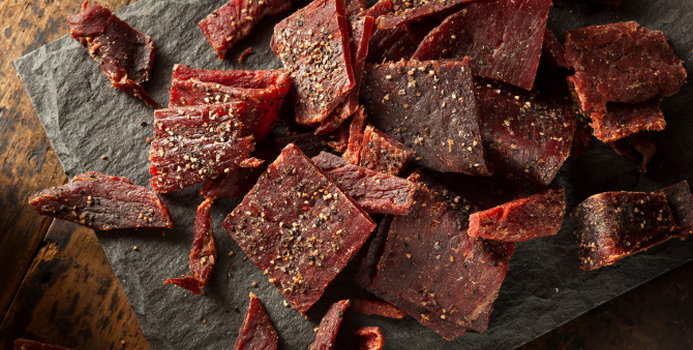Beef jerky is widely known and loved, but with the growing popularity of other meats used for jerky there plenty of other options, including turkey jerky. While both are low in fat and make a great healthy treat the whole family can enjoy, there are some nutritional differences between them that may help you make the choice of which is the best jerky for you. They are generally available in the same flavors, which include teriyaki, original, peppered, and hot and spicy. Regardless of the jerky you end up choosing, it's the perfect snack for travel or outdoor activities, and a healthy snack for the whole family.
Beef Jerky Nutrition
Beef jerky is the most well-known and consumed, but other forms of jerky are quickly catching up. Beef jerky is a little more chewy than turkey jerky, but smaller companies tend to cut their pieces larger and have more time to prepare the meat, since they work in smaller batches. Nutritional facts for beef jerky are as follows:
Serving Size: 1 oz.
- Calories: 73
- Total Fat: 1g
- Cholesterol: 20mg
- Sodium: 410mg
- Carbohydrates: 4g
- Fiber: 0g
- Sugar: 1g
- Protein: 12g
- Vitamin A: 0%
- Vitamin C: 0%
- Calcium: 0%
- Iron: 8%
Note that nutritional facts may vary slightly by brand depending on their own specific marinade recipe. This information is based on the House of Jerky brand Beef Jerky Natural flavor.
Turkey Jerky Nutrition
Turkey jerky has been quick to gain popularity with those working toward healthier living and less red meat. Red meat is hard on the digestive system, while poultry is easier and quicker for the body to break down. Though poultry is generally healthier, the differences nutritionally can be similar in most areas. Nutritional facts for turkey jerky include:
Serving Size: 1 oz.
- Calories: 89
- Total Fat: 0.5g
- Cholesterol: 25mg
- Sodium: 410mg
- Carbohydrates: 8g
- Fiber: 0g
- Sugar: 5g
- Protein: 13g
- Vitamin A: 0%
- Vitamin C: 0%
- Calcium: 0%
- Iron: 4%
Note that nutritional facts may vary slightly by brand depending on their own specific marinade recipe. This information is based on the House of Jerky brand and Teriyaki Turkey Jerky flavor.
How to Choose
Whether you choose beef jerky or turkey jerky is really a personal decision. If you don't eat beef, turkey jerky is a great alternative that still offers the low-calorie, high protein snack that travels well. One of the best ways to sample and choose between them is to invest in a food dehydrator and make a batch of your own. Not only can you experiment with flavors, but you can cut the meat as thick or thin as you want to control the level of moisture and thus juiciness.
Jerky is a protein packed, low fat snack that's highly versatile and can fit the tastes of most anyone. The only real problem with jerky is the high sodium levels. You can compensate for this with a lower sodium diet on the days you're consuming jerky, or look for brands that offer low-sodium varieties. If you have a butcher in your area, ask whether they make beef or turkey jerky; this is often where you'll find the best jerky available.



